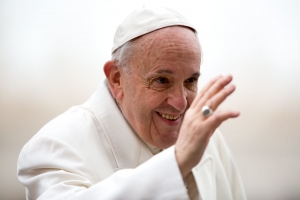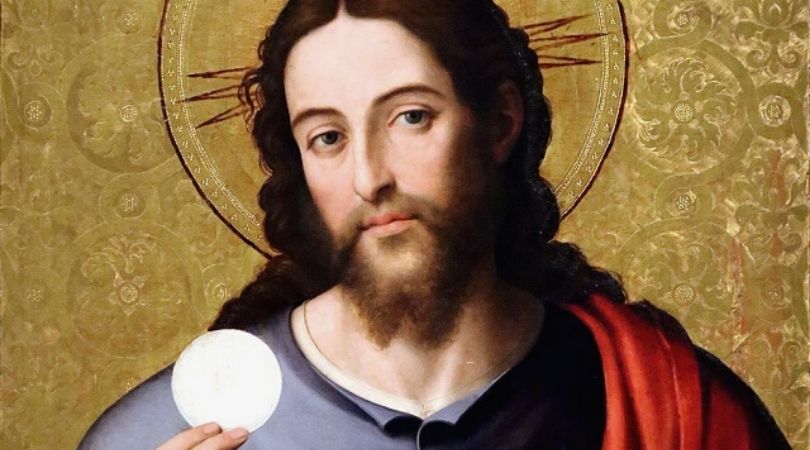Edward Pentin began reporting on the Pope and the Vatican with Vatican Radio before moving on to become the Rome correspondent for the National Catholic Register. He has also reported on the Holy See and the Catholic Church for a number of other publications including Newsweek, Newsmax, Zenit, The Catholic Herald, and The Holy Land Review, a Franciscan publication specializing in the Church and the Middle East. Edward is the author of “The Rigging of a Vatican Synod? An Investigation into Alleged Manipulation at the Extraordinary Synod on the Family”, published by Ignatius Press. Follow him on Twitter @edwardpentin
Photo: Pope Francis at his weekly general audience, April 4, 2018.
A look at some of the Holy Father’s previous teachings on holiness ahead of the publication of his new apostolic exhortation ‘Gaudete et Exsultate’ on Monday.
By Edward Pentin, EWTN, 4/5/18
 The Vatican announced Thursday that Pope Francis will publish an apostolic exhortation on holiness titled Gaudete et Exsultate (Rejoice and Be Glad).
The Vatican announced Thursday that Pope Francis will publish an apostolic exhortation on holiness titled Gaudete et Exsultate (Rejoice and Be Glad).
Subtitled “on the call to holiness in the contemporary world,” the exhortation will be presented April 9 by Archbishop Angelo De Donatis, vicar general of Rome, Italian journalist and friend of the Pope, Gianni Valente, and Paola Bignardi, former president of Catholic Action Italy.
To give some idea of what to expect, it might be helpful to see what the Holy Father has said in the past about holiness.
In November 2014, he dedicated his general audience catechesis to the theme and underlined the “universal vocation to being saints,” a vision he said which was recovered at the Second Vatican Council.
He stressed that sanctity is “not something we can procure for ourselves” and that all are “called to be saints” in their daily lives. “The Lord asks only this: that we be in communion with Him and at the service of our brothers and sisters,” he said.
Francis also said the path to holiness can take the form of small acts of good will and prayer, in particular the Rosary.
“Dear Brothers and Sisters, Good morning,
One of the great gifts from the Second Vatican Council was that of recovering a vision of the Church founded on communion, and grasping anew the principle of authority and hierarchy in this perspective. This has helped us to better understand that all Christians, insofar as they have been baptized, are equal in dignity before the Lord and share in the same vocation, that is, to sainthood (cf. Lumen Gentium, nn. 39-42). Now let us ask ourselves: what does this universal vocation to being saints consist in? And how can we realize it?
1. First of all, we must bear clearly in mind that sanctity is not something we can procure for ourselves, that we can obtain by our own qualities and abilities. Sanctity is a gift, it is a gift granted to us by the Lord Jesus, when He takes us to Himself and clothes us in Himself, He makes us like Him. In his Letter to the Ephesians, the Apostle Paul states that “Christ loved the church and gave himself up for her, that he might sanctify her” (5:25-26). You see, sainthood truly is the most beautiful face of the Church, the most beautiful face: it is to rediscover oneself in communion with God, in the fullness of his life and of his love. Sanctity is understood, then, not as a prerogative of the few: sanctity is a gift offered to all, no one excluded, by which the distinctive character of every Christian is constituted.
2. All this makes us understand that, in order to be saints, there is no need to be bishops, priests or religious: no, we are all called to be saints! So, many times we are tempted to think that sainthood is reserved only to those who have the opportunity to break away from daily affairs in order to dedicate themselves exclusively to prayer. But it is not so! Some think that sanctity is to close your eyes and to look like a holy icon. No! This is not sanctity! Sanctity is something greater, deeper, which God gives us. Indeed, it is precisely in living with love and offering one’’ own Christian witness in everyday affairs that we are called to become saints. And each in the conditions and the state of life in which he or she finds him- or herself. But you are consecrated. Are you consecrated? — Be a saint by living out your donation and your ministry with joy. Are you married? — Be a saint by loving and taking care of your husband or your wife, as Christ did for the Church. Are you an unmarried baptized person? — Be a saint by carrying out your work with honesty and competence and by offering time in the service of your brothers and sisters. “But, father, I work in a factory; I work as an accountant, only with numbers; you can’t be a saint there…”. “Yes, yes you can! There, where you work, you can become a saint. God gives you the grace to become holy. God communicates himself to you”. Always, in every place, one can become a saint, that is, one can open oneself up to this grace, which works inside us and leads us to holiness. Are you a parent or a grandparent? — Be a saint by passionately teaching your children or grandchildren to know and to follow Jesus. And it takes so much patience to do this: to be a good parent, a good grandfather, a good mother, a good grandmother; it takes so much patience and with this patience comes holiness: by exercising patience. Are you a catechist, an educator or a volunteer? Be a saint by becoming a visible sign of God’s love and of his presence alongside us. This is it: every state of life leads to holiness, always! In your home, on the street, at work, at church, in that moment and in your state of life, the path to sainthood has been opened. Don’t be discouraged to pursue this path. It is God alone who gives us the grace. The Lord asks only this: that we be in communion with Him and at the service of our brothers and sisters.
3. At this point, each one of us can make a little examination of conscience, we can do it right now, each one respond to himself, in silence: how have we responded up to now to the Lord’s call to sanctity? Do I want to become a little better, a little more Christian? This is the path to holiness. When the Lord invites us to become saints, he doesn’t call us to something heavy, sad… quite the contrary! It’s an invitation to share in his joy, to live and to offer with joy every moment of our life, by making it become at the same time a gift of love for the people around us. If we understand this, everything changes and takes on new meaning, a beautiful meaning, a meaning that begins with little everyday things. For example: a lady goes to the market to buy groceries and finds a neighbour there, so they begin to talk and then they come to gossiping and this lady says: “No, no, no I won’t speak badly about anyone”. This is a step towards sainthood, it helps you become more holy. Then, at home, your son wants to talk a little about his ideas: “Oh, I am so tired, I worked so hard today…”. — “But you sit down and listen to your son, who needs it!”. And you sit down, you listen to him patiently: this is a step towards sainthood. Then the day ends, we are all tired, but there are the prayers. We say our prayers: this too is a step towards holiness. Then comes Sunday and we go to Mass, we take communion, sometimes preceded by a beautiful confession which cleans us a little. This is a step towards sainthood. Then we think of Our Lady, so good, so beautiful, and we take up the rosary and we pray it. This is a step towards sainthood. Then I go out to the street, I see a poor person in need, I stop and address him, I give him something: it is a step towards sainthood. These are little things, but many little steps to sanctity. Every step towards sainthood makes us better people, free from selfishness and being closed within ourselves, and opens us to our brothers and sisters and to their needs.
Dear friends, in the First Letter of St Peter this is asked of us: “As each has received a gift, employ it for one another, as good stewards of God’s varied grace: whoever speaks, as one who utters oracles of God; whoever renders service, as one who renders it by the strength which God supplies; in order that in everything God may be glorified through Jesus Christ” (4:10-11). This is the invitation to holiness! Let us accept it with joy, and let us support one another, for the path to sainthood is not taken alone, each one for oneself, but is traveled together, in that one body that is the Church, loved and made holy by the Lord Jesus Christ. Let us go forward with courage on this path to holiness.”
The Pope said something similar to his earlier catechesis at a general audience last June:
“May the Lord give all of us the hope of being saints. But some of you might ask me: “Father, can one be a saint in everyday life?”. Yes, it is possible. “But does this mean that we have to pray all day?”. No, it means that you must do your duty all day: pray, go to work, take care of your children. But everything must be done with the heart open to God, so that work, even in illness and suffering, in difficulty too, is open to God. And in this way one can become a saint. May the Lord give us the hope to be saints. Let us not think that it is a difficult thing, that it is easier to be delinquents than saints! No. We can be saints because the Lord helps us; he is the One who helps us.
This is the great gift that each of us can make to the world. May the Lord grant us the grace to believe so profoundly in him as to become for this world the image of Christ. Our history needs “mystics”: people who reject all dominion, who aspire to charity and fraternity; men and women who live, also accepting a portion of suffering because they take on the burdens of others. But without these men and women, the world would have no hope. For this reason, I wish for you — and I also wish for me — that the Lord may grant us the hope of being saints.”
And at a general audience in October 2013, the Pope called on the faithful not to be “afraid of holiness.”
“Do not be afraid to aim high,” he said, “to let yourself be loved and purified by God, do not be afraid to let yourself be guided by the Holy Spirit.”:
“A final question: what can I, a weak fragile sinner, do? God says to you: do not be afraid of holiness, do not be afraid to aim high, to let yourself be loved and purified by God, do not be afraid to let yourself be guided by the Holy Spirit. Let us be infected by the holiness of God. Every Christian is called to sanctity (cf. Dogmatic Constitution Lumen Gentium, nn. 19-42); and sanctity does not consist especially in doing extraordinary things, but in allowing God to act. It is the meeting of our weakness with the strength of his grace, it is having faith in his action that allows us to live in charity, to do everything with joy and humility, for the glory of God and as a service to our neighbour. There is a celebrated saying by the French writer Léon Bloy, who in the last moments of his life, said: “The only real sadness in life is not becoming a saint”. Let us not lose the hope of holiness, let us follow this path. Do we want to be saints? The Lord awaits us, with open arms; he waits to accompany us on the path to sanctity. Let us live in the joy of our faith, let us allow ourselves to be loved by the Lord… let us ask for this gift from God in prayer, for ourselves and for others.”







